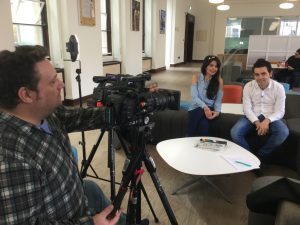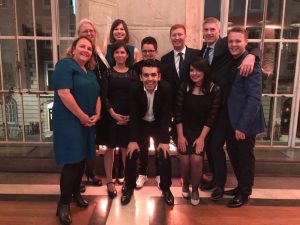Switzerland’s tradition of learning: “a point of reference on the global stage”
“All too often, graduates of traditional academic degrees feel that their studies have left them unprepared for the workplace”
For the eighth year in a row, Switzerland has been ranked the world’s most innovative country by the World Intellectual Property Organisation. It is a country famed for its economic health and political stability.
Some may be surprised, then, to learn that less than a third of Swiss people under the age of 25 enter traditional academic higher education, or what the Organisation for Economic Co-operation and Development calls “tertiary-type A” education – theory-based programs lasting at least three years.
It’s not that Switzerland doesn’t value education. Quite the contrary: Switzerland has long recognised the importance of providing a range of educational pathways for different needs and objectives. Apprenticeships and vocational training play a key role in the country’s education system, with approximately 70% of young Swiss people participating in these programs either before or instead of attending university.
Vocational education gives teens the opportunity to combine classroom learning with entry-level responsibilities in the workplace, preparing them for careers in technology, services and health as well as traditional trades and crafts. It enables students to develop the skills they want and the skills employers need. As a result, youth unemployment in Switzerland is among the lowest in the world (8.1%, compared to the OECD total of 11.9%), and the Swiss educational model has become a point of reference on the global stage.
The Swiss tradition of learning by doing has also shaped the nation’s higher education landscape. Switzerland excels in research, with the Swiss Federal Institutes of Technology (EPFL and ETH Zurich) ranked as among the best engineering and technology universities worldwide. In addition to academic universities, the country offers a number of universities of applied sciences specialising in practice-oriented bachelor’s and master’s degrees, where apprentices who hold a Federal Vocational Education and Training (VET) Diploma or Federal Vocational Baccalaureate may qualify for admission. These industry-specific programmes enable graduates to make a smooth transition from studies to their career.
“We have found that this dual approach is key to ensuring that students can apply their classroom learning to real-world contexts”
In the area of hospitality management, for example, four out of the world’s top ten institutions are based in Switzerland. At both Glion Institute of Higher Education and Les Roches Global Hospitality Education, the Swiss model of combining practical and academic learning forms the backbone of the curriculum. Bachelor’s degree students are immersed in hospitality operations, such as guest service, culinary studies and housekeeping, as well as business theory, such as finance, entrepreneurship and luxury branding.
This experience enables them to develop professionalism, communication, adaptability and other essential soft skills as well as business management expertise. In addition, students are required to complete two internship semesters and are encouraged to work and study abroad to further enhance their employability.
We have found that this dual approach is key to ensuring that students can apply their classroom learning to real-world contexts. Specialist programmes that maintain close ties with the industry are better equipped to prepare students with the necessary skills for their chosen profession. It’s an educational experience that is valued by students and companies alike: in the 2018 QS World University Rankings, Glion and Les Roches rank first and third respectively for employer reputation among hospitality management institutions worldwide.
“Youth unemployment in Switzerland is among the lowest in the world “
All too often, graduates of traditional academic degrees feel that their studies have left them unprepared for the workplace. The Swiss model of blended theoretical and practical learning has become increasingly attractive not only in Switzerland but around the world. Today, Glion offers its curriculum through a branch campus in London, UK, while Les Roches also has campuses in Marbella, Spain and Shanghai, China. For career-focused students, the integration of vocational and academic education offers a compelling alternative.
About the author: Dr Pierre Ihmle is Chief Academic Officer of Sommet Education, the hospitality education group that includes Glion Institute of Higher Education and Les Roches Global Hospitality Education


